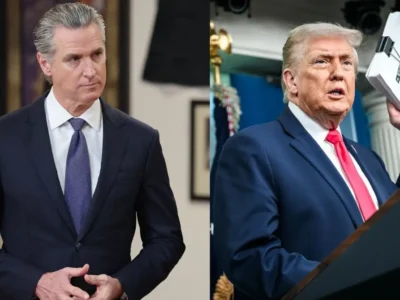Trump’s Campaign to Gag Activist Shareholders
His recent executive order tries to “protect” oil companiy management from smart climate planning.
Exxon management was not pleased when shareholders forced them to produce a report on how climate change would impact their business. In May, Exxon is facing another shareholder vote on whether to form a climate change committee on the Board of Directors and whether to disclose how sea level rise will impact its investments on the Gulf Coast. The SEC rejected Exxon’s plea to quash the shareholder vote.
Naturally, President Trump is siding with Exxon management. In an apparently effort to rescue fossil fuel companies from such embarrassment, Trump’s recent executive order on fossil fuel expansion attempts to put a roadblock in the way of such shareholder efforts. Section 5(b) of the executive order threatens major institutional investors with retaliation if they support these efforts. Specifically, it requires the Secretary to “omplete a review of existing Department of Labor guidance on the fiduciary responsibilities for proxy voting to determine whether any such guidance should be rescinded, replaced, or modified to ensure consistency with current law and policies that promote long-term growth and maximize return on ERISA plan assets.”
This executive order seems to be swimming against the current in the business world. Many corporations have taken strong positions on climate change. Many of them made carbon commitments prior to the Paris Agreemet and over six hundred have joined the Ceres climate declaration. One revealing statement was from the director of global sustainable agriculture at Monsanto, who said, “This is directly related to our business. . . We need to provide solutions while farmers are facing climate change.” Monsanto is on track to be carbon neutral by 2021 and has long accepted as fact something the Trump administration has not: that absent swift action, human-induced climate change could be catastrophic for business. It was among the more than 745 companies and big investors that signed a post-election letter expressing full support for the Accord. And after Trump announced his intention to withdraw from the Paris Agreement, numerous major corporations endorsed the “We’re Still In” effort.
It is hard to credit the argument that a pension fund violates its duties to invest prudently when it supports a shareholder resolution on climate change. First, even if they were misguidedl, such resolutions are very unlikely to have a material effect on corporate earnings. Surely forming a shareholder committee or disclosing climate risks wouldn’t smash Exxon’s share prices. And second, major private investors are also supporting these motions. For instance, the climate resolution that was previously adopted by Exxon shareholders was supported by major financial firms like Blackrock and Vanguard. These are for-profit institutions that surely would not take any actions that would imperil their investments. Meanwhile, the CERES organization represents more than 160 institutional investors, collectively managing more than $26 trillion in assets.. It works with investors to better manage these CERES works with investors to better manage climate risks and improv e disclosures.
And in fact, there are strong reasons to think that responding to climate change is a smart business strategy. Climate change regulations will surely impact the oil business, and corporate managers should be planning ahead. It’s also clear that rising sea levels and other effects of climate change are going to pose problems for companies that have so many of their operations on or near the ocean. Indeed, Blackrock, the world’s largest asset manager, recently warned that investors are seriously undervaluing the business risks associated with climate c change.
The Trump Administration’s action is a threat to efforts to overcome the inertia of corporate managers on the climate issuel. But it’s also an opportunity. It puts the spotlight on sound financial reasons for companies to take climate change seriously. The shareholder advocates can win this debate and by doing so advance the campaign for climate-smart business planning. They can also win the ensuing litigation. See you in court, Mr. President.
Reader Comments
7 Replies to “Trump’s Campaign to Gag Activist Shareholders”
Comments are closed.






Interesting article but way too many typos.
Thanks for pointing those out. Partly due to technical glitches. They’ve been fixed now.
There is a more meaningful alternative to litigation: divestment from oil companies and reinvestment in alternative energy.
Serial-child-molestor-Jeffrey-Epstein-supporter Alexander Acosta (Secretary of Labor) cannot regulate proxy voting by pension fund managers who vote with their dollars and divest. The University of California currently holds about $3.5 billion in oil industry stocks and students have been pushing divestment for years. They have gained the support of over 700 faculty, numerous Academic Senate resolutions, and 4 Chancellors, but the Regents have resisted divestment on the ground that they can influence change from within.
Maybe it’s time to influence change from without.
Prof. Farber, I have spent years commenting on your LP blog with the hopeless hope that you folks, some of the best and brightest at UC, would produce implementable solutions that the late Nature Editor Sir John Maddox said are absolutely necessary to protect the future of the human race. Tragically, while you folks have done an excellent job of documenting the problems like this post proves, you have totally failed to produce implementable solutions and we now have far too many toppled tipping points proving time has run out far faster than we forecast even a decade ago. And your posts are now turning into epitaphs.
Dan, just to let you folks know, tomorrow is EARTH DAY, first of which was in 1970 when Walt Kelly (Pogo) made the famous declaration:
“We have met the enemy and he is us.”
It is now 2019 and this statement is now our ultimate epitaph because intellectuals have totally failed to produce implementable solutions, proving once again they refuse to heed this most important lesson of history, even when it comes to saving the human race.
FYI, today is the 49th anniversary of Earth Day.
On Earth Day 1 In 1970 atmospheric CO2 was 324 ppm and in March 2019 it was 412 ppm, having already zoomed past Bill McKibbens “350 or Bust” warning with no control in sight.
When are you folks going to unite with all other UC environmental experts to protect the future of the human race?
I understand your feelings, but commenting on a blog is not taking action, nor is expecting other people to take action. Engineers produce implementable solutions (and implement them) once activists and legal people have cleared a path and figured out how to pay for it. The people here at LP are clearing that path, and engineers at UC and elsewhere are getting solutions ready, and in many cases, implementing them.
It is up to you to listen to scientists and engineers and make sure others are aware of solutions for now and solutions still in the pipeline, and what they mean. This is my job and I am doing it; I patented a wave energy conversion device, and have made presentations on ocean carbon sequestration. One of my frequent collaborators in technical papers is doing hydrodynamic analysis of kelp farming, wave energy conversion and mooring and power export systems for offshore wind turbines. Another friend in the WEC area is also doing design work on ammonia fueled ships (zero greenhouse gas potential). UC Berkeley itself is incubating yet another WEC startup (and a lot of other stuff, including the ultimate answer, fusion).
Meanwhile you can do stuff right now – did you donate to otter restoration on your state taxes, for example? Do you have a EV, hybrid or PHEV? (Yes, I do, and my neighbor, an engineer who works for DOE, has a Tesla – it replaced his 2007 Prius. He also has geothermal heat.) Have you told people you know in business about things they can do about energy efficiency, for example? (Do you know what is possible?) Have you implemented them yourself? Do you have a heat pump? Do you have a roof solar heater to boost it during the winter? Do you have solar PV panels? Did you install a solar heated absorption cooling system? Have you been to your local agencies to make sure they are doing what they can? Do you support people who are implementing solutions? Thanks to one small fuel saving initiative I put in place, my lifetime carbon footprint is reduced by about 25 million gallons of diesel fuel so far, but I am an engineer and that is just doing my job, but I need your support and that of people like LP to be able to do it. My organization put in a landfill gas combined power and heat plant almost ten years ago and in addition to eliminating energy input from the grid, they are preventing methane, a much more powerful green house gas, from entering the atmosphere.
You also need to be knowledgeable. Do your understand the physics of global warming well enough to explain it to people who don’t? Have you explained it to them (you don’t actually have to mention 97% of scientists – basic global warming is simple and as readily proven than gravity)? Have you looked into nuclear fission power enough to understand it? How do you feel about thorium cycle systems, for example? Are you aware that fast breeders cannot actually produce plutonium that can be used in a fission bomb due to Pu 240 contamination?
Each person contributed something to this problem, a little bit at a time. Each person needs to contribute to the solution in whatever way they can.